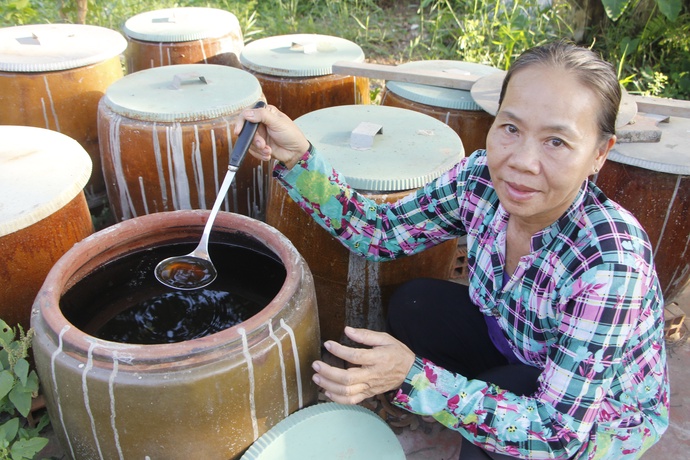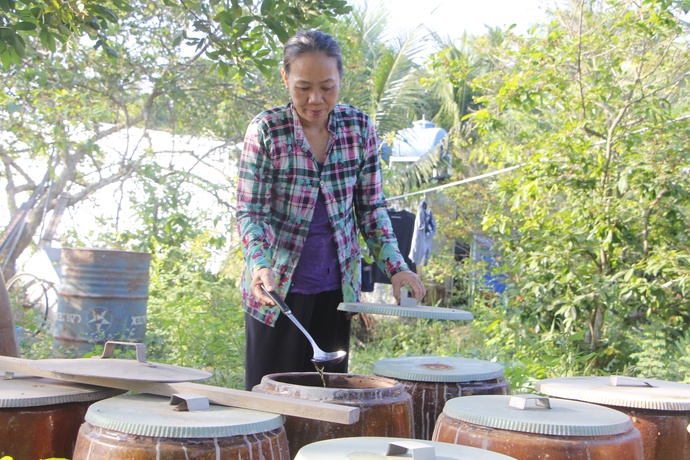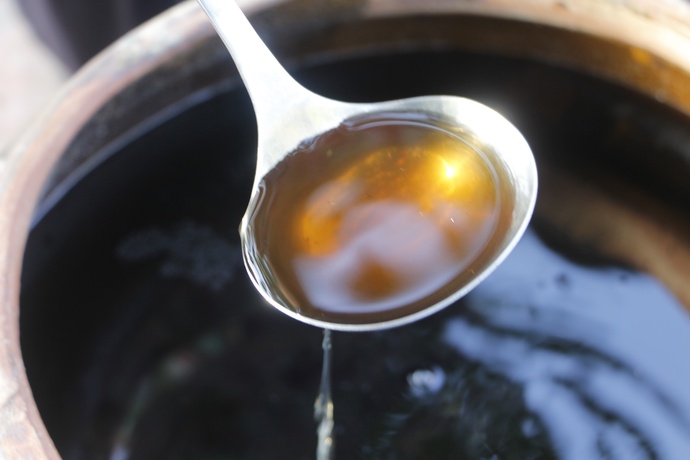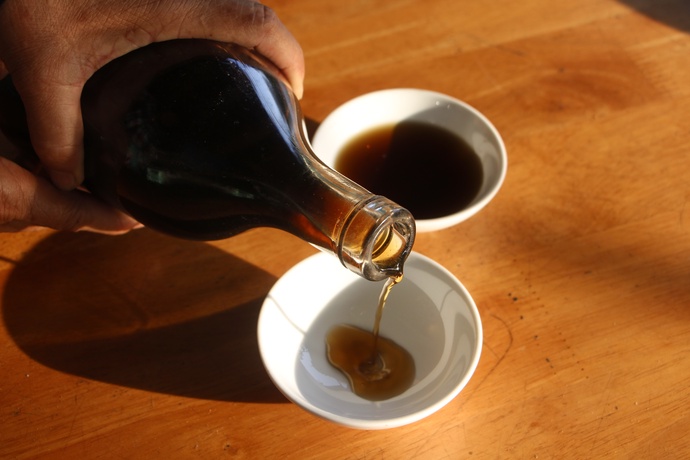Requiring no more than wild-caught fish and sea salt, Vietnam's Mekong Delta residents such as 56-year-old Pham Kim Ngan, also known as Bay Muon, have been keeping the practice alive by sticking to traditional methods that have been passed down from generation to generation.
Ngan, a resident of Can Tho City’s Son Islet, has spent much of her life making fish sauce from fermented freshwater fish in her humble home.
Growing up on the secluded islet, her earliest memories include making fish sauce with her father.
While her grandmother first pioneered the family’s tradition of making fish sauce, it was the abundance of fish near her father’s home on Son Islet that helped the family’s business take off.
“I still remember my father catching boatloads of wild fish and shrimp just by leaving a net underwater," Bay Muon shared.
"We caught so much that we were able to barter the big fish for rice and other necessities and had plenty of small fish left over to make fish sauce,” Bay Muon shared.
“Big catches will be exchanged for rice and necessities, while smaller ones like Smith’s barb, java barb, Siluriformes, and snakeskin gourami would be processed into fish sauce for domestic use."
|
|
| Bay Muon with her urns of fish sauce in Can Tho City, Vietnam. Photo: Chi Cong / Tuoi Tre |
Bay Muon’s father, who already died, typically filled each massive fermenting urn with 35 kilograms of freshly caught fish, as well as 15 kilograms of sea salt, to begin the fermentation process, sandwiching thin layers of salt between thick layers of fish until the massive jar is filled to the brim.
Over time, the salt slowly draws out juices from the fish, giving way to the faint, unmistakable smell that is indicative of high-quality fish sauce.
It takes at least ten months for the concoction to mature, but Bay Muon’s father preferred letting it set for a full year, ensuring there is enough time for the fish flesh to disintegrate and absorb the salt before simmering the raw sauce over a wood fire for four uninterrupted hours.
After simmering, the sauces are filtered several times to remove undissolved bones and meat.
“The final product should be amber, viscous, and so pungent that the smell blankets the village,” Bay Muon said.
|
|
| The fish sauce produced at Bay Muon's workshop boasts a unique amber hue. Photo: Chi Cong / Tuoi Tre |
Tides of change
For nearly four decades, Bay Muon’s family has stuck to the same fish sauce recipe, yet many are worried that the declining fish supply in the Mekong Delta might force a change on the local industry.
According to Bay Muon, 15 years ago, the fish caught in a single net would be enough to fill multiple urns, but as the quantity of Siamese mud carp and other fish the family depends on for their sauce continues to decrease, she has found herself resorting to purchasing fish from the local market.
“I have become such a familiar client that some of the fishers sell fish exclusively to me,” she explained.
Still, business is pretty good.
|
|
| Visitors enjoy a hotpot meal prepared by Bay Muon. File photo: Chi Cong / Tuoi Tre |
Last year, Bay Muon fermented nearly five tons, equating to 5,000 liters of fish sauce.
With each bottle of one liter priced at VND100,000 (US$4.3), her loyal customers in Ho Chi Minh City, Hanoi, Binh Duong Province, and Dong Nai Province have helped her keep sales up and her business out of the red.
Notably, she sold 700 liters during the 2021 Lunar New Year holiday in early February and does well selling to tourists, friends, and acquaintances.
Her budding sales figures, however, have been recently hampered by a reduced tourist turnout caused by the COVID-19 pandemic.
|
|
| The fish sauce produced at Bay Muon's workshop boasts a unique amber hue. Photo: Chi Cong / Tuoi Tre |
Taking the situation into account, Bay Muon is still positive about the future.
“I am looking to expand my facility, buy more urns, and find more supply sources,” she shared.
“Once tourism is revived, more customers will return to buy my products.”
Traditionally made fish sauce is hard to find these days, said Tran Van Thuan from Phung Hiep District, Hau Giang Province, one of Bay Muon’s customers.
“The thickness, concentration, and color are very unique.
"You can feel the umami and freshness of wild-caught fish with just a slight taste.”
Like us on Facebook or follow us on Twitter to get the latest news about Vietnam!































